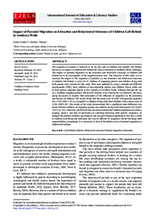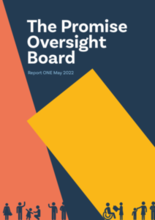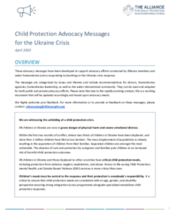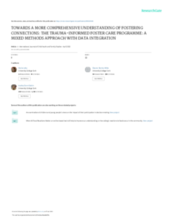Demographic Data:
|
Sources: World Bank, UNDP, DHS 2010-11 |
Displaying 1621 - 1630 of 14348
The migration of parents is believed to be for the sake of children and families left behind. However, its impact on children left behind has been overlooked in Southern Wollo, Ethioipia. The impact of parental migration on the education and behavioral outcomes of children left behind has to be investigated in the migration-prone area. The objective of this study was to examine the impact of the migration of parent(s) on the education and behavioral outcomes of children left behind.
This is the first report from The Promise Oversight Board on progress that Scotland is making to keep the promise. It was a promise made to care experienced infants, children, young people, adults and their families. It was also made to families who live around the ‘care system’ and whose lives are impacted by its decisions. The promise made reflects a commitment that had already been made through the National Performance Framework - that every child grows up loved, safe and respected and able to realise their full potential.
Safety parents – charged with the temporary care of children in emergency cases – have called on the government for much-needed financial support. The Department of Social Development said as many as 1 300 children had been placed in the care of safety parents in the province.
These advocacy messages have been developed to support advocacy efforts conducted by Alliance members and wider humanitarian actors responding to and working on the Ukraine crisis response. The global subgroup on Children's Care and Ukraine, which is co-led by the Alliance's Unaccompanied and Separated Children Task Force (UASC) and the Global Collaborative Platform on Transforming Children's Care, developed the messaging for the UASC section.
This paper describes a mixed methods approach that was applied to evaluate the complex intervention Fostering Connections: The Trauma-Informed Foster Care Programme, a recently developed trauma-informed psychoeducational intervention for foster carers in Ireland.
Inside a cavernous stone fortress in downtown Pittsburgh, attorney Robin Frank defends parents at one of their lowest points—when they risk losing their children. The job is never easy, but in the past she knew what she was up against when squaring off against child protective services in family court. Now, she worries she’s fighting something she can’t see: an opaque algorithm whose statistical calculations help social workers decide which families should be investigated in the first place.
LIFE inside an orphanage is an emotional roller-coaster—“always testing the tested”—Musaib says without blinking an eye. The orphan yet to observe his 18th birthday narrates his nightmare that comes to haunt his stay in the house of orphans. The nightmare starts with an Azaan that suddenly turns into a resounding scream. A siren-wailing ambulance can be heard next in that dusk hour. It unsettles Musaib who leaves his prayers and embraces his mother tightly.
Millions of children across Ukraine have had to flee their homes since the war there began. For some, it’s an even harder journey, because they don’t have their parents with them. One children’s home on the eastern front line had to move all of their children hundreds of miles across the country to keep them safe. Among them is 11-year-old Angelina, who’s now trying to make a new life in the western city of Lviv.
More than 5m people have fled the Russian invasion, and many have carried with them trauma and loss. That has been compounded by the economic stress of living abroad, and by family separation—Ukrainian men aged 18-60 must stay and help defend their country. The World Health Organisation (who) estimated in March that at least half a million refugees were suffering from mental-health issues.





